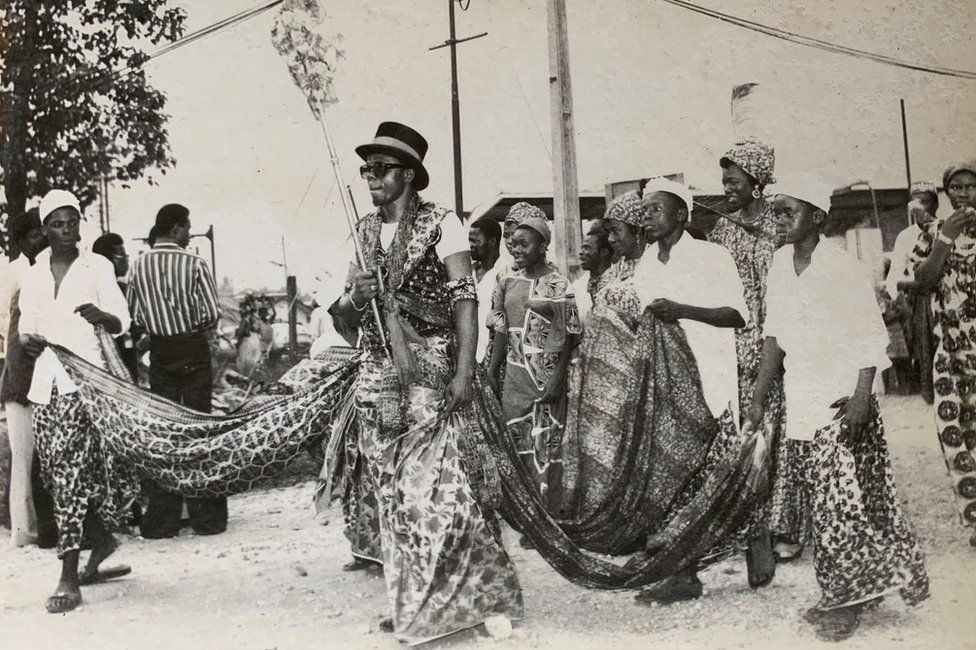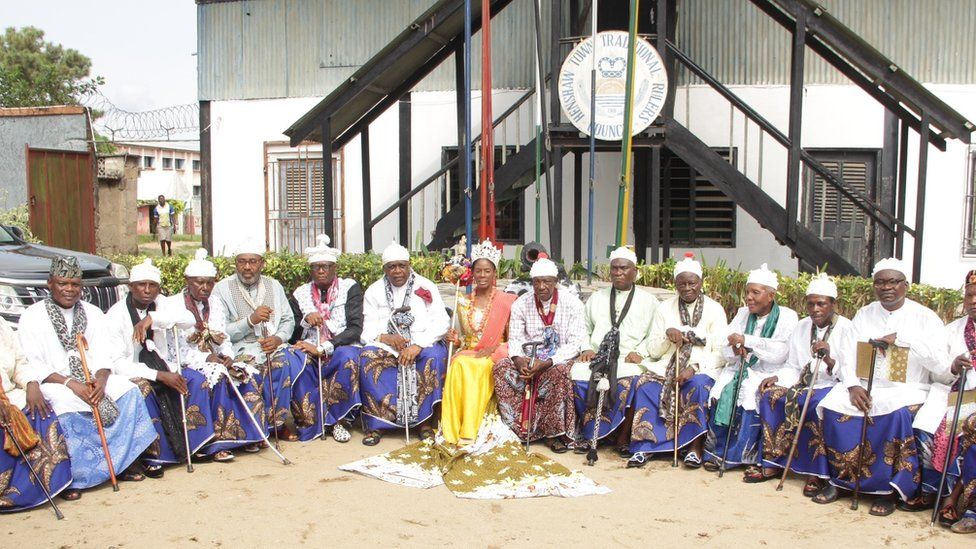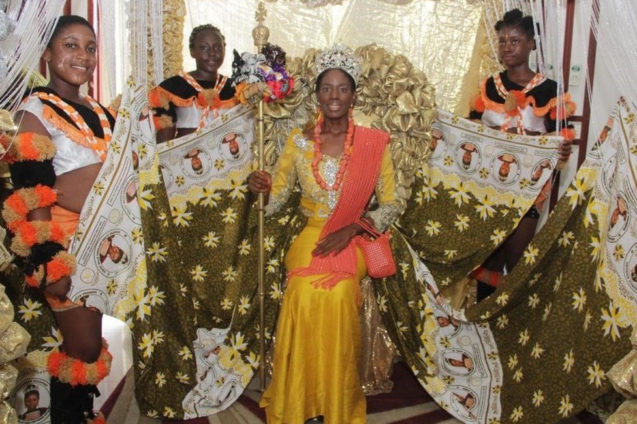With low expectations of elected politicians in Nigeria, Barbara Etim James is convinced that the solution to many of the country's problems lies with its many chiefs, kings and queens.
Two years ago, the 54 year old was crowned a queen in the Efik kingdom in southern Nigeria.
Despite 20 years of living in the UK and founding a private equity firm, she says she is not a moderniser who wants to transform long-established African leadership structures to fit a Western model.
"Modernising suggests that you're making something traditional more Western," she says.
Ms James wants to turn that on its head.
"I'm bringing my global experience into a culture, not taking the culture into modernity."
Ms James combines her role as the head of a private equity firm with that of queen, often travelling from her hometown of Calabar to cities like Lagos and Abuja for work.
"Calabar is my base but I spend a lot of time outside. But I have sort of field workers on the ground," she says.

Members of the traditional council in her community are required to be physically present in Calabar for monthly meetings and she has to fly back home for these from wherever she is - a situation that she hopes technology can change.
"I am now having conversations with them about online meetings," she says.
The suggestion may at first appear outrageous to people who consider it an insult to invite a respected person to an event by text message or phone - you have to send them a card, Ms James says.
"But they are very happy when people send them money online or by phone to their account," she says, an argument she uses to support her point during discussions about enhancing culture with technology.
Politicians 'only for short term'
The role of traditional rulers in Nigeria is not defined by the constitution and some see them as archaic institutions that have outlived their usefulness.
Cases where traditional rulers were ejected from their positions over accusations of not showing politicians support or respect have also highlighted that their roles are largely symbolic and raised questions about how much real power they hold.
They also lack an independent source of finance.
But Ms James believes that people like her can be more effective than politicians in bringing about change.
She argues that traditional rulers are closer to the people than their elected representatives as through their network of informants they have more of a sense of what is really going on.
This means they can have more impact than the political class when addressing issues like security and poverty, especially as their involvement is more long term, she says.
"State governors usually spend the first year settling down, the second year getting to work, the third year preparing for re-election, and the fourth year on elections," she says.
"They come and go so they have shorter interest but traditional rulers tend to be there for life."
Nevertheless, apart from having some money allocated by local government, few traditional rulers have a thought-through economic plan for improving the lives of their people.
This is where the queen believes her experience outside the traditional role can come in handy.
"We have strong social groups but they don't think economically," she says.
"It's all social and consuming but not economic. Celebrations, ceremonies, events... But what can you do together? Can you own a farm? Can you own an enterprise?"
She has set up an enterprise fund, giving out small loans for people who want to start or expand their businesses, and organises entrepreneurship and finance training for different cultural groups.
She says she wants people to "think economically" - how to make money as well as spend it.
Inspirational father
The Efik kingdom is headed by a king, known as an Obong.
Based in the coastal town of Calabar, capital of Cross River state, he presides over a layered network of 12 Efik family groups, and subgroups, including one called Henshaw Town
In 2019, in recognition of the active role she had played in the Efik kingdom over the previous decade, Ms James was crowned the Obong-Anwan (queen) of Henshaw Town.
Her mother, who had been Obong-Anwan, died in 2016, but the position is not hereditary.
"Every House can have a queen but mostly they don't.
"First of all it's a responsibility so you really need someone with the capacity to help people. It's expensive.
"There's a lot of patronage involved," says Ms James, pointing out that she funds most of her community projects with personal, or privately raised, funds.
The queen's love of her people and culture began when she was a child, watching her late father, Emmanuel Etim James - an assistant police commissioner who later worked for an international oil company - actively participate in his local community.

"He was very involved. He sort of brought all the things that he was involved in globally back home.
"He built a big house and got the whole community to build houses, bought cement for them, and I witnessed all that," she says.
After she completed her studies in computer science at the University of Lagos, she moved to London for a master's degree in business systems analysis and then settled in the UK.
But she never lost the connection with home.
"Having travelled around the world, and being exposed to all sorts of things, it helps you value what you have.
"It is unique, it is special, and it needs nurturing," she says.
"Many people grow up, get exposed, move to Lagos or Abuja, and they have little interest in or value in their life for their hometown or their village. I am very different."
'The women are strong'
In 2009, she got divorced from an Irish man after 12 years of marriage and moved back to settle in Calabar. Marriage is not a requirement for an Obong-Anwan.
"In Efik culture, the woman's status is not derived from her husband," the queen explains.
"The women, we are strong in our own way."
Her - and her people's - attachment to the past also means that they have not turned their backs on the connections with the British colonialists.

The Efik acted as middlemen in the Transatlantic slave trade and the longstanding interactions between the people of Calabar and British merchants led to a high level of assimilation.
Many in the region bear English surnames, such as Duke, Henshaw and James. The traditional clothing of the men and women appears to be related to the fashions of the Victorian era.
People in some parts of Nigeria have tried to erase similar signs of the colonial presence and association by changing their surnames and street and town names, but Ms James does not see that as necessary.
"The Efik don't feel the need for that replacement therapy.
"It is not because we are not enlightened or do not read about our colonial past. It is just that we think it is a reality and we are not ashamed," she says.
"It happened. That is not to say we don't recognise the negative aspects of colonialism and slavery… It's just that we don't hold it against the British."
Instead, she believes that the focus for Nigerian ethnic groups should be on innovation that can sustain the culture rather than obliterate it.
"How can we revive our traditional dance groups? How can we save our languages from extinction? How can we make sure our cultures do not die but flourish into the next generation?" she asks.
These are the discussions she has been having with her people and the issues for which she wants her tenure as the Obong-Anwan of Henshaw Town to be remembered.
Latest Stories
-
NDC Obuasi East MP-elect hails Supreme Court decision on re-collation
6 hours -
2024/25 GPL: Kwame Opoku scores on return as Asante Kotoko beat Gold Stars
6 hours -
Philip Nai and friends spend time with kids of Agblezaa on Christmas eve
8 hours -
Education is in crisis – NCPTA General Secretary
8 hours -
Celebrating 65 years of impact: Commonwealth scholars and fellows alumni in Ghana
8 hours -
Our confidence in the law has borne fruits – Ebi Bright on SC ruling
8 hours -
Mandamus application to be heard by new High Court judge – Supreme Court rules
9 hours -
Krofuom residents attack GNFS personnel as fire destroys Trinity TV and church
9 hours -
Movie review: Peter Sedufia’s ‘One Night Guests’
10 hours -
Three dead, several injured in accident on Cape Coast-Accra highway
10 hours -
MTN donates to support two hospitals in Savannah region
10 hours -
NDC victory a call to action for agricultural and economic revitalization in Ghana – Klutse Kudomor
10 hours -
Adidome Chief alarmed over rising teenage pregnancy in Central Tongu, calls for collective stakeholder action
10 hours -
MTN Foundation celebrates Christmas with new mothers across Ghana
10 hours -
MTN Ghana presents hampers to 60 Christmas babies in Central region
10 hours

